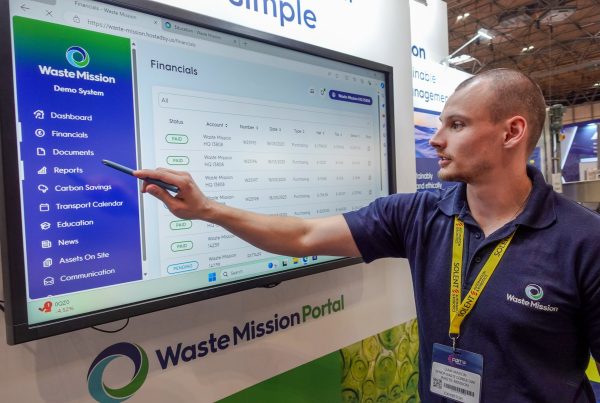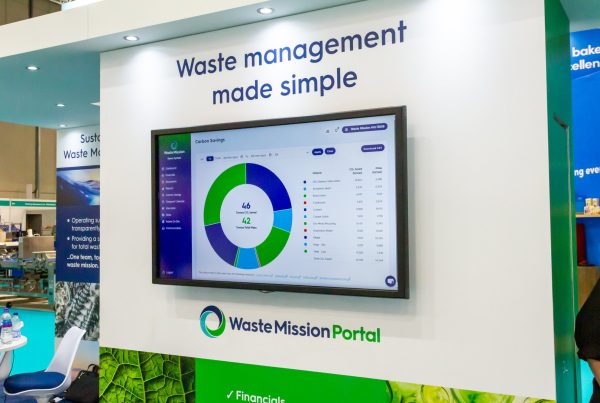Flat white, cappuccino, latte—nothing beats that first cup of coffee to kickstart the working day. Despite being known as a nation of tea drinkers, the UK drinks 98 million cups of coffee daily.
But what do we do with the waste? Where do staff and customers throw the spent coffee grounds, the used paper cups, and the plastic coffee capsules?
This guide to recycling coffee waste will provide your business with top tips on the most environmentally friendly ways to dispose of waste coffee grounds, coffee cups, and used coffee capsules. We’ll also explore new ideas to help your business embrace circular economy initiatives, reduce your company's carbon footprint, and save money on waste disposal.
Recycling Coffee Grounds
Do your employees use coffee grounds to make their drink of choice? If so, where does the waste end up? In the UK, half a million tonnes of waste coffee grounds end up in landfill.
Sadly, this is terrible for our planet. As the spent coffee grounds break down, they produce methane gas, which is “80 times more harmful than carbon dioxide for 20 years after it is released.”
But it’s also costly for companies, as wet coffee grounds are heavy, increasing the price of general waste collection. At Waste Mission, we love helping customers turn often-ignored waste streams into profit. In fact, by using our costing out method, we have saved our customers, on average, 40 per cent of their general waste prices. If you want to explore this further, please book a waste review with our team.
With growing pressure to hit ESG targets, companies across the UK need to explore new sustainable waste disposal plans. Old coffee grounds are a great place to start.
4 Environmentally Friendly Ways to Dispose of Coffee Grounds
- Compost coffee grounds.
Used coffee grounds contain nitrogen, phosphorus, and potassium, making them perfect for composting. To collect coffee grounds, set up containers with sturdy lids in each kitchen area. - Choose a wormery.
How would your employees like to have pets in the office? Worms do a wonderful job of breaking down organic waste and can save businesses money on waste disposal. The RHS has some helpful tips. - Anaerobic Digestion.
Anaerobic digestion is a technology that composts food waste while producing renewable energy. It has incredible environmental and economic benefits. Find out more in our recent blog. - Reuse
Many innovative companies are repurposing used coffee grounds into new products. From fire logs and skincare products to trainers and growing mushrooms, explore options to donate or repurpose your old coffee grounds. Local horticulture groups or farming initiatives might be interested in collecting coffee grounds for composting.
The bottom line to remember: is don’t let coffee grounds end up in the general waste bin.
Let’s explore another item ending up in landfills in huge quantities – the paper coffee cup.

Coffee Cup Recycling
In the UK, more than 2.5 billion disposable paper coffee cups are used and thrown away each year. Only 0.25 per cent are recycled.
No matter how focused companies are on promoting reusable cups, disposable paper cups find their way into the workplace. At Waste Mission, customers regularly ask how to recycle the growing number of used coffee cups, so let’s tackle that now.
Are Paper Coffee Cups Recyclable?
Yes, paper coffee cups can be recycled but they can’t be thrown into the mixed recycling bin. They are lined with wax or plastic to prevent leaking. To be recycled, the paper cup has to be stripped of its plastic or wax coating and broken down.
To ensure coffee cup recycling occurs in their businesses, companies need to invest in a dedicated coffee cup recycling bin and a cup collection service.
Our dedicated team at Waste Mission can set this process up for you and help you find the best coffee cup recycling bin for your company. Call us today at 01438 745307.
Recycling coffee cups becomes easy for customers or staff when they can simply empty liquids into one part of the bin and place their used paper cups into another.
Benefits of Coffee Cup Recycling for Your Business
With ESG targets high on the agenda for businesses across the UK and a need to find new revenue streams, there has never been a better time for businesses to reap the benefits of recycling disposable paper cups.
Here are three wins to coffee cup recycling:
- Reduce your general waste disposal costs and landfill tax
- Boost your recycling credentials and reduce your carbon footprint
- Improve your environmental impact and meet your ESG targets
There are many alternative products your paper cups can be used for. Finding new ways to embrace the circular economy, where nothing is wasted, will help to boost your green credentials. How about turning your disposable paper cups into a great brand story?
James Cropper turns coffee cups into luxurious paper. Selfridges turn used coffee cups into their iconic yellow bags. Martha Brook turns paper cups into notebooks.
However, it’s always best to encourage customers and staff to bring reusable cups into the workplace where possible. Imagine how much waste would be reduced if every person took their own cup home at the end of the day.
Now, let’s tackle a big one. Recycling coffee pods and capsules.

Coffee Pods and Capsule Recycling
Coffee pods and coffee capsules. Do you know the difference? The two phrases are often used interchangeably, making for added confusion.
Let’s explore the difference between them.
Coffee pods
Coffee pods look a bit like tea bags. They are round and flat, and although they are made from paper, they can be topped with an aluminium foil lid.
Coffee Capsules
Coffee capsules are small containers made from soft or hard plastic or aluminium.
Coffee capsules are the real bugbear. For coffee lovers, they’re the perfect way to brew a delicious cup without stepping into any coffee shops. Yet statistics show that 56 billion coffee capsules end up in landfills every year, and only five per cent are recycled.
The Problem with Coffee Capsules
Most coffee capsules are made from plastic. Some have aluminium lids, while others have plastic lids. Each company manufactures coffee capsules slightly differently, making it tricky to know what is recyclable.
With 95 per cent of coffee capsules being thrown away in general waste, not only does that increase landfill costs for companies, but it’s also terrible for our planet. As the plastic capsules break down, they release toxins into the soil.
Recycling Coffee Capsules in Your Business
At Waste Mission we are committed to helping companies build a future a few shades greener. We can help you explore the best recycling options for your business and ensure that those pesky coffee capsules are not delaying your ESG targets.
We can discuss the different brands of capsules you use, install collection bins, and arrange the disposal of your coffee capsule waste.
Choosing an alternative to coffee capsules
Coffee capsules have soared in popularity because they are wonderfully simple and produce the most delicious cup of coffee. Yet, if your customers and staff knew the number of capsules ending up in landfills every year and the subsequent knock-on effect on the health of the soil and the planet, would they start to reconsider?
How about leading a coffee revolution in your business? Move away from coffee capsules and use fresh coffee beans.
Bean-to-cup coffee machines reduce waste and energy consumption, allowing you to buy whole beans from sustainable sources and grind them on-site. Here are a few options from Nationwide Coffee.
Summary
Businesses across the UK can play a key role in leading the way with recycling coffee waste and ensuring staff and customers get their caffeine fix in the most environmentally friendly way possible.
If this blog post has inspired you to make changes within your company, give us a call. We would love to help you reduce your company’s carbon footprint, save money on waste disposal and embrace more circular economy initiatives.
At Waste Mission our focus is on making complex waste streams simple from a single point of contact. We’ll take the stress from you by offering a bespoke, tailored service.
Book a waste review today or give us a call on 01438 745307.





